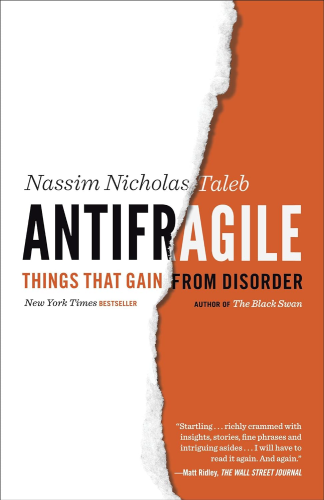What I’ve Learned from Reading Antifragile
If something is antifragile, not only does it not break in the face of chaos, stress, shock or volatility, but also overcompensates and gain from them. The book Antifragile by Nassim Taleb explains this very interesting phenomenon, and is full of nuggets of wisdom.
Bottom-Up Is Antifragile
The antifragility of a collection comes from the fragility or volatility of its elements.
The author talks about how Switzerland’s lack of centrality actually makes it stable. Cantons, the municipals of Switzerland, are left to their own device. Residents argue, debate a lot. It doesn’t seem harmonious. And yet, this very volatility at the municipal level protects the society against the romanticism of utopias, and leads to the stability at the upper level.
The historical decline of Chinese science is also discussed in the book. As the Chinese society became less bottom-up, the Chinese people lost their hunger for trial and errors . Because they no longer had the drive to tinker like the Europeans, they missed the opportunity to invent the spinning machine, even though China at that time already had all the means to do so.
I can see how bottom-up can instill a sense of agency and empowerment within individuals, which then results in the robustness or prosperity of the larger group. We learn faster when we are able to choose the things that we’d like to learn. Companies are more innovative when ideas from employees are welcomed, valued and implemented. We feel more alive and fulfilled when we are given the freedom to choose the best way to live our life that suits us rather than following the rigid roadmap imposed upon us by society. Bottom-up is energetic and liberating while the opposite is stifling and suffocating.
Never Stop Tinkering
Risk taking is “convex” or antifragile according to the book: Many attempts will fail, but as long as the losses aren’t fatal, the payoff will be huge once there’s a success. Entrepreneurship is risk taking, and from the perspective of the author, that’s America’s biggest asset.
Real progress comes from doing rather than talking. It didn’t happen because of the theories people later came up with to try to explain the breakthrough. We should never underestimate the accumulated effect of small actions and the progress they can generate. We should never stop tinkering.
The industrial revolution didn’t happen because people suddenly knew how to revolutionize industries at that time, but because of the actions they had taken: It was the craftsmen’s tinkering that led to the creation of the steam engine. According to the book, the ancient Greek already had the knowledge of using steam to power devices, but nobody had actually use this knowledge to build any device for practical, useful work.
To harness risk and volatility, the author also talks about the barbell strategy. This strategy puts a cap on risk exposure so that we won’t be devastated by the downside while at the same time still have the chance to reap the huge benefit generated by the upside.
So throw away the false belief that we need to have all the knowledge ready before we can start working on something. Action breeds knowledge, rather than the other way around. Without action, there shall be no progress. Be biased towards action and be smarter with risk.
Let Nature Do Its Thing
Nature and organisms are inherently antifragile. Once we understand this, we’ll refrain from what the book calls naive intervention, which takes away the healthy amount of stressors that the organic needs in order to thrive.
Iatrogenics is an example of naive intervention: Unnecessary treatments and excessive medications actually do more harm than good to the body. They disrupt our natural healing power that reacts to stressors that causes our body to overshoot to make us healthy and strong.
Not doing is just as important as doing. In the book, it’s called via negativa.
Final Thoughts
If you’ve read this far, you might be asking: how on earth does luck have anything to do with this antifragility thing?
Well, here’s how I think they are related: Don’t shy away from chaos, risk and volatility. Less talking, more doing. Have an entrepreneur spirit. Take risk while at the same time hedge against it wisely. Tinker, explore, experiment. Value small actions, celebrate failures. If we do this, we’ll be able to take advantage of the opportunity that come with the randomness in life and become lucky. If more people do this, we’ll be able to make our society better.


